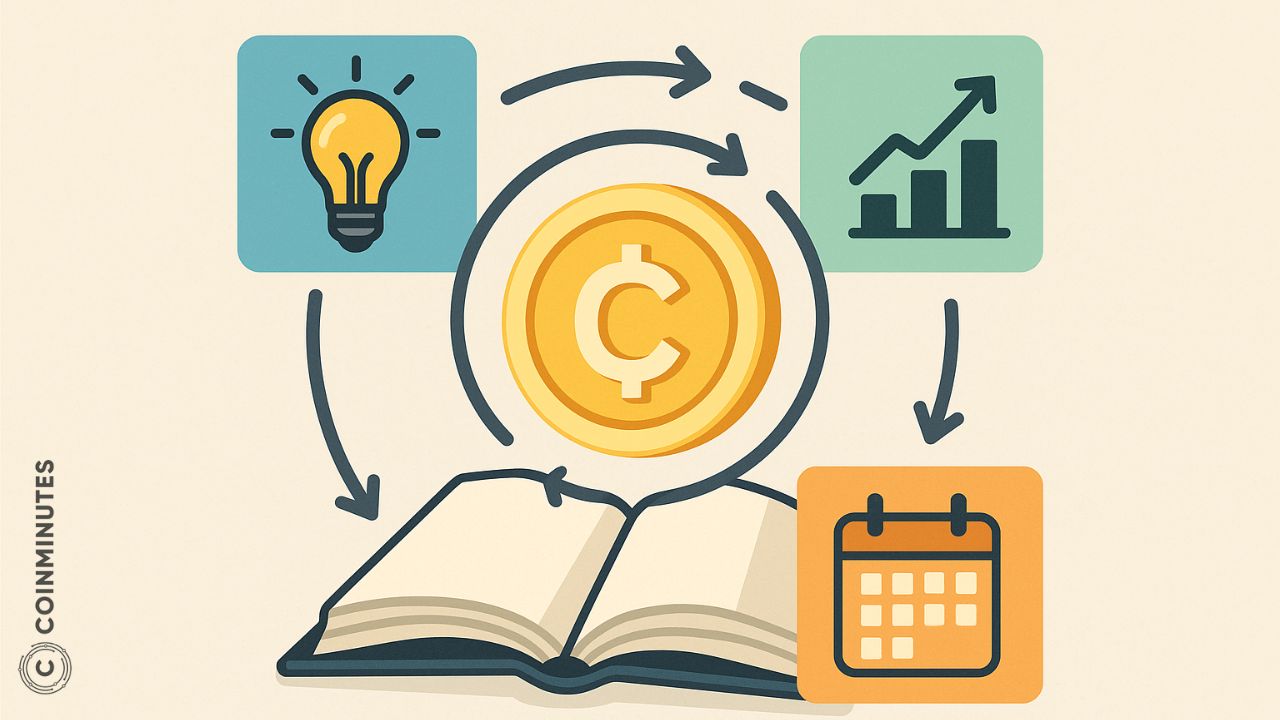You will forget most of the things you read about crypto. That's just the way brains function.
You read an article about blockchain, feel nice about your understanding, and then someone asks you to explain it the following week and you have no idea. It happens to all of people. Your brain throws away the information it doesn't use - that's normal.
Because of this, we invented CoinMinutes in a different way. Just reading articles is not enough. You need to repeat, practice, and have people to talk with about what you are learning. The knowledge that mavens hold comes from doing, not only reading.
The Challenge: Why Lasting Knowledge Is Hard to Achieve in Crypto
Crypto keeps changing so fast that you can't really keep up with it.
What was working in March is totally different in June. By the time you heard about it last year, there was no way it could handle millions of transactions. You can't just learn crypto one time and be done - the knowledge gets outdated even quicker than people say.
People get confused because they only read and never try. Suppose a person reads a complete guide of setting up a wallet, understands every step, then decides not to follow the instructions and never makes a wallet. After three months, the same person wants to buy some crypto, but he doesn't remember anything from that article. Reading helps understanding the ideas. When you do, you get real skills.
Publications always assume you have prior knowledge which you probably don't. An article explaining yield farming expects the reader to be familiar with liquidity pools. That article assumed that you know smart contracts. That one required you to know gas fees first. If you miss just one piece, everything that follows will not make any sense.
There is no one who monitors their knowledge. People study different topics on various websites, gather information, but fail to make any connections. There is no framework. No obvious way. Just a bunch of facts lying around in your mind.
The volume of stuff is so huge that it gets hard for you to even think of starting.
Thousands of different cryptocurrencies. Dozens of wallet options. Hundreds of exchanges. If you try to learn everything at once, you won't learn anything. Your brain will just shut down.
Useful Reference: https://t.me/s/coinminutes

Crypto knowledge is hard to keep up with because everything changes fast and learning often feels disconnected.
The CoinMinutes Model: Foundations for Lasting Learning
We start off with the basics that remain the same regardless of any fluctuation in crypto.
Private keys are what give you the access. Transactions cannot be reversed. Decentralization is the fact that no one is really in charge. These facts are still valid whether it is 2025 or 2030. If you build on such solid things, the complicated ones will eventually make more sense.
Same concepts get repeated all the time but at different places and different contexts. A Bitcoin article refers to transaction fees. An Ethereum article talks about gas costs. Another one that compares blockchains talks about network charges. All these are different words for the same thing. Your brain starts to see the patterns and even gets the concepts without looking.
Yes, we assign you some tasks outside the lesson. Sounds annoying, isn't it? But it really works.
Each article is very well related to the others. Links help you to see what needs to be read before and after. There is never a need to guess what the next step is. Some people use the exact sequence that we have advised. Others just pick up from what they are interested in. Both ways are possible because the connections can be there whoever you are.
Memory anchors in real life are much better than mere words. We don't just give you a definition of a rug pull and that's it - we disclose the actual projects that fell, how the warning signs looked, how much money people lost. This way, it turns indirect concepts into direct ones in the form of stories that you will remember.
Reinforcement Through Community and Collaboration
Other people catch your mistakes before they cost you real money.
The CoinMinutes community reviews each other's understanding constantly. Someone posts "I think I'll send ETH using the Bitcoin network to save on fees" and three people jump in to explain why that won't work. You learn from their mistake without having to make it yourself.
Discussion threads go way deeper than any single article can. An article explains staking in 800 words. The comments contain dozens of specific questions and detailed answers about different scenarios. Someone asks about tax stuff. Another person shares what happened when they tried a specific validator. All that collective knowledge exceeds what any one article could ever cover.
Group challenges keep people engaged and learning together. "Set up a testnet wallet this week" gets 50 people actually trying it. They share screenshots, help each other fix problems, celebrate when stuff works. Doing things with other people beats doing them alone - always has.
People who've been around six months help people who joined yesterday. They remember being confused about the same exact things. Their explanations use normal words because they haven't been in crypto long enough to forget what was hard to understand.
Mistakes get shared openly instead of hidden. Someone sent tokens to the wrong address and lost them. They post about it. Twenty people read that story and now they triple-check addresses before sending anything. One person's $200 mistake saves others thousands. That's more valuable than any tutorial.
Community members flag outdated information fast. An article mentions a feature that changed last month. Someone comments about it. We update the article within days. The community acts like quality control, catching things that slip through our reviews.
Ensuring Knowledge Stays Current and Relevant
Content ages like fish in Cryptocurrency Market. We know this.
Major articles get reviewed every single month. Fee structures change. New features launch. Security recommendations evolve based on new threats. An article from January might need serious updates by February. We check systematically, not whenever we feel like it.
Breaking news triggers immediate updates. Major exchange gets hacked? Articles recommending that exchange get revised the same day. New regulation passes? Compliance guides update within hours. Can't wait weeks to fix information people are actively relying on.
Old content gets archived instead of deleted. Someone might've bookmarked an article from last year. We don't erase it - we slap a banner on top explaining what changed and link to the current version. History matters. You can see how things evolved over time.
New developments get covered quickly. Popular layer-2 solution emerges? We publish a guide within days. Don't wait months to write about what people are trying to learn right now.
Version history shows what changed and when. An article updated on October 15th displays that date right at the top. You know whether you're reading current stuff or something that needs a refresh. Transparency builds trust, period.
Community suggestions drive what we write about. Ten people ask about the same topic? That becomes an article. We write what people actually want to learn, not what we think they should know.

Crypto content is constantly updated, archived transparently, and improved based on community needs and new developments.
The Impact: From Novice to Knowledgeable Community Member
People start knowing absolutely nothing about crypto and end up explaining it to their friends. That's the goal.
The transformation happens in stages you can actually see. First, basic concepts click - what crypto is, why it exists, how it's different from regular money. Takes a few days of reading and asking questions.
Next comes completing actual transactions. Buying, sending, receiving. Each action reinforces concepts they read about earlier. Theory becomes practice. Knowledge turns into skill you can use.
Then they explore whatever interests them specifically. Some dive into DeFi. Others get into NFTs. Some just want to hold long-term and ignore the rest. The foundation lets them branch out confidently in whatever direction makes sense for them.
Eventually, they start answering questions instead of asking them. Someone new shows up confused about wallet safety. A member who's been around six months shares what they learned. Teaching other people cements your own understanding better than anything else.
How long this takes varies wildly between people. Some go from zero to competent in a few weeks. Others need months. Speed doesn't matter much. Retention does. Someone who learns slowly but remembers everything beats someone who rushes through and forgets it all.
Confidence grows in ways you can measure. Early posts start with "Is this a dumb question?" Later posts say "Here's what I tried and what happened." Certainty replaces anxiety. That shift shows real learning occurred, not just information passing through.
Conclusion
Understanding crypto is either an incremental process or you lose your understanding.
Did you read something once and then forget? That is evaporation. Learn, practice, discuss, and apply? That is compounding. Coinminutes Cryptocurrency has created a system for compounding - they repeat concepts, assign tasks, connect people, and update constantly.
It's not that we want you to memorize facts by force. We wish you to be so comfortable that you can easily recognize scams, evaluate opportunities, and refrain from making errors. There are some people who want to gain profound expertise, while others just want to use it safely. Both are possible here.
Find More Information: Explore the Cryptocurrency Market with Coinminutes


